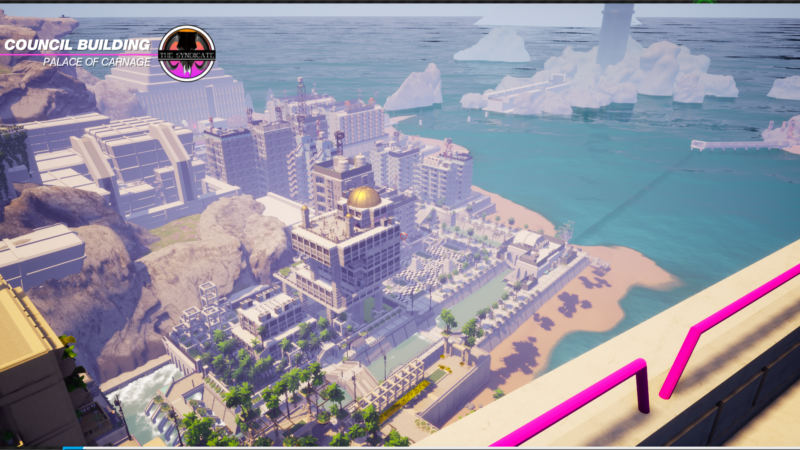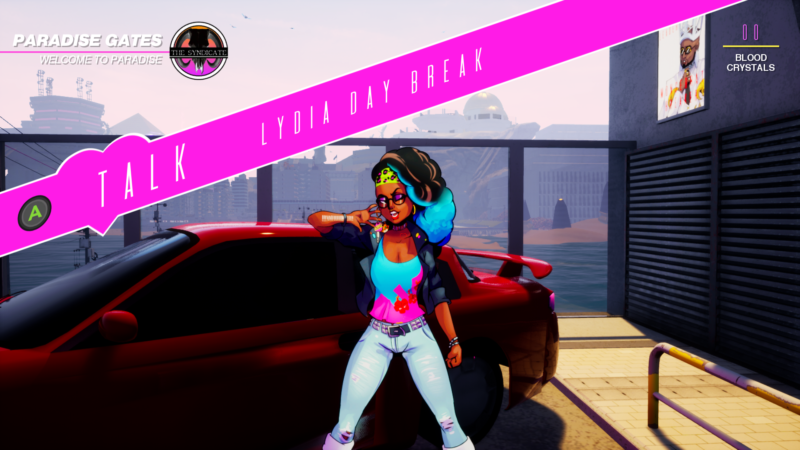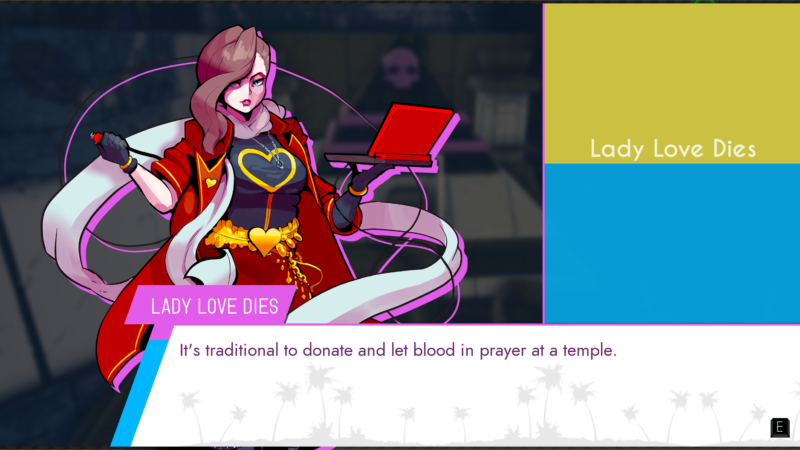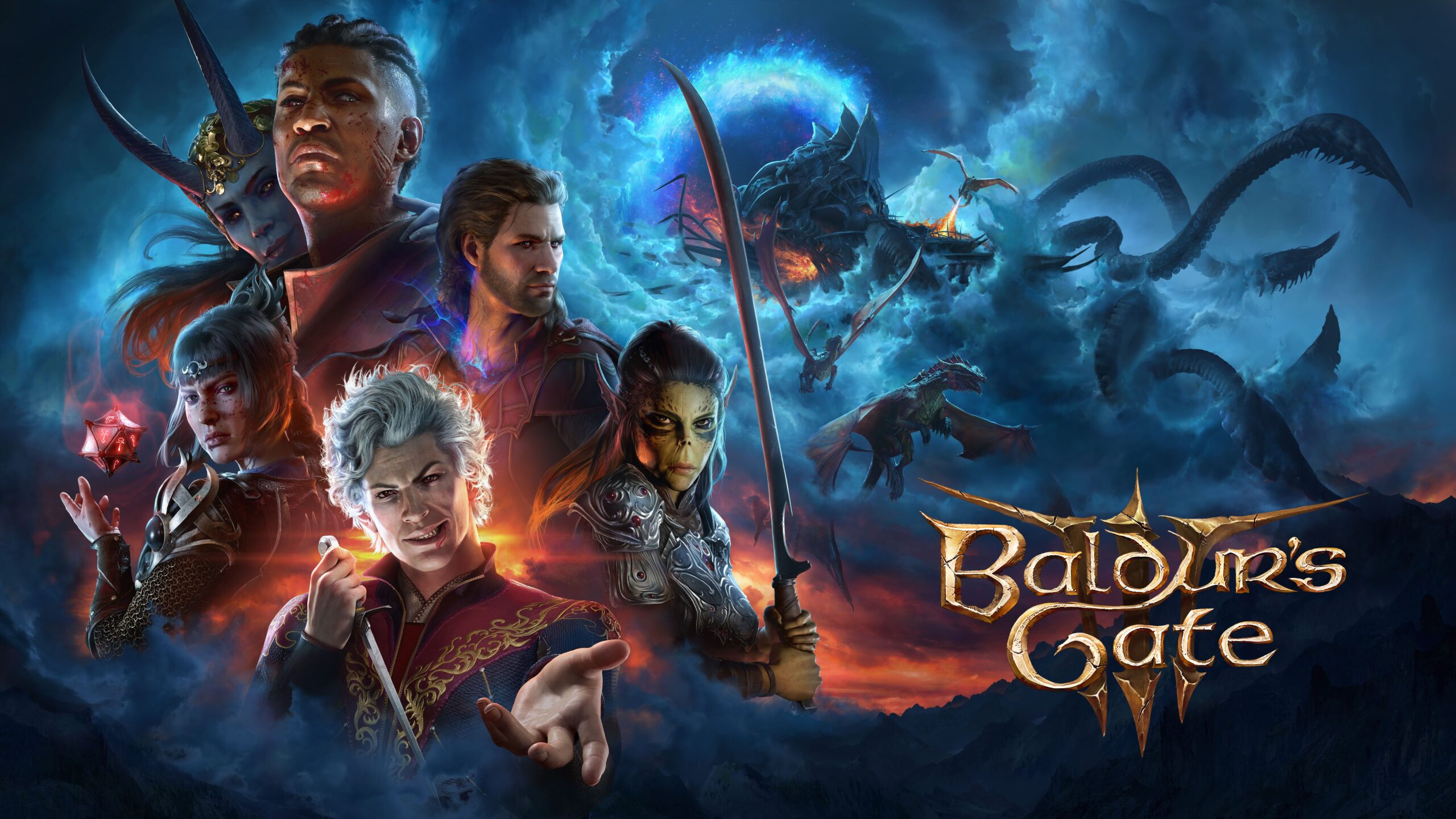
Paradise Killer: Material Concerns
This piece contains spoilers for Paradise Killer.
Ty,
The world of Paradise Killer is material. Though an alternate dimension, constructed by an immoral cult who worship cosmic horrors, all the bits and pieces of society are accounted for. There is housing, shipping, food supplies, vending machines, bathrooms, prisons, and a barracks. Once, in sheer delight, I explored the roof of the massive government building, only to find a sea of air conditioning units. It does get hot in Paradise.
In contrast, the detective, Lady Love Dies, is immaterial. She gets double jumps by taking foot baths. She breaks into and slides apart the cracks of the world. While the killer is still on the loose, they will not impede your investigation. All loss happens before Lady Love Dies arrives or is done by her hand at the end. Even before the game begins, the island is sealed off. The suspects are finite. Cycles of day and night drape the island in new hues, but it doesn’t mean anything. You will always have enough time to tie up loose ends. Though the game has a diverse set of possible end states, given time and a little ingenuity, you will know everything there is to know about the Paradise Killer. This is my ultimate frustration with the game: though it has a map of material relationships, it fails to understand the unfathomable weight and vastness of a real world. Lady Love Dies, and by extension the player, can know all and see all.

There is, of course, plenty that pushes against that knowledge. Most of the games’ collectibles are fragments of a life now dead. In preparation for traveling to another, supposedly perfect, island, the entire citizen population of paradise was sacrificed. Their literal and metaphorical ghosts linger in postcards, soda cans, fishbowls, and on sidewalks. The small mystery of mundanity, cut short, never to be solved. On a cosmic scale, hundreds of statues of gods dot the island. Without taking meticulous notes, it would be difficult to keep them all straight or to learn their histories. The only one of the Gods you meet is elusive and distant, speaking an alien language.
What suggestion there is, though, is cut off by the games structure. Since the island is separated from the rest of the world, that mystery also feels contained. Each item you pick up is part of a set. Eventually you gain the ability to see them all at the press of a button. My inner completionist relishes this. It still makes me long for narrative beats that do not feel like pieces of a puzzle. Though Paradise Killer is aesthetically fractured and diverse, it still slots into my mind. It’s a vaporwave pastiche of the post postmodern tumblr age, but pull at the seams and you will discover a set of gleaming gears. The island is but a glittering machine, that you will soon know every inch of. The music exposes this. The soundtrack is not pieces set to the environment, but a customizable playlist. Paradise is the land of pure vibes. It is pleasant, but so rarely diverse or disturbing.
To the game’s credit, that strange beauty is intentional. Though once exiled, Lady Love Dies is welcome back and her friends all make up central pillars of the cult. It is pleasant for them to be there. It is beautiful for them. They designed it. All the horror is confined to the whispers of spirits and inaccessible rooms. It is a haunted world, whose terrors have been squeezed into the margins. Of course this world seems good to Lady Love Dies, she once helped build it.

The image of horror behind plain white walls feeds into the blunt metaphor of Paradise Killer’s island. Its gods are just another symbol of capital. A large civilian body, forced to work and eventually fed to an indifferent God, for the profit of the ruling class… does this sound familiar yet? Paradise’s Gods are CEOs, imperialists, and presidents. They are familiar evils, human ambitions made divine with little lost in the exchange. To be frank, this is too easy for me. I longed for moments where I really felt horror or awe. Instead, I only felt the chillness of the summer wind and the satisfaction of knowing how the world works. What is the point of a God, if you can deduce it, but not fear it?
These symbolic gods remind me of the massive Mecha in the Friends at the Table season Counter/Weight. The season’s villain, Rigour, is also a god, also a machine, also a symbol of capital. It is a massive, ancient robot that compels bodies to work in service of an endless, destructive production. It is also strange. It was made by human hands, but it now stretches beyond them, making humans into its own tools, piloting its own pilots. Rigour’s shadow is long felt. It corrupts characters beyond recognition, and transforms those seemingly outside of its influence subtly and irreversibly. To me, this is a more potent metaphor of how capitalism functions. Rigour is not distant, but omnipresent, observational, expanding. The horrible gods are not dead in pyramids waiting to be revived. They are here right now, putting their hands around your throat.
Additionally, the fear of the divine requires a human presence. Though petty and still human, Lady Love Dies is also one of the immortal chosen. The abilities she gains over the course of the game will make her master of these islands. In contrast, two other games I played this year, Disco Elysium and Pathologic 2, emphasize frailty in the face of divine forces. Artemy of Pathologic is a doctor and Harry Du Bois of Disco is a detective. Both are exiled members of their communities, like Lady Love Dies. All three of them have mysteries to solve and little time to do it. Harry and Artemy, though, get hungry, bleed, and die. Time matters for them and they lose opportunities. They cannot explain or contextualize the supernatural things they find. In those games, there is the weight of a body, the push and pull of time. There is a self in friction with both the hard concrete and the soft shells of other bodies. In Paradise Killer, you are alone. Lady Love Dies is a leaping, death-defying detective. She knows that the concrete ground will catch her. She is almost a god herself.

Still, that hollow world, that immoral being, points at horrible truths of policing and “detecting.” At the end of the game, every remaining person on the island is put on trial. During these trails, you can withhold information, condemn those who you want to die, and save the guilty who are your friends. It is honest about the ways justice can be marred by investigation and how impartial ideals can give way to very human ambitions. Having the power to get all the information also means you have the power to wield it. It is that moment when the world of Paradise Killer snaps into focus. It is all in service of the simple violence of state retribution.
To confirm this, Justice, the impartial entirety who called Lady Love Dies back from exile, grants her complete control over her weapon after the trials. You now can kill the innocent. You can wipe the slate clean. Lady Love Dies can make the world in her image. For this moment, for this community, you hold all the cards. It’s a disorienting contrast to the evidence gathering of the earlier game, but a pointed one. Despite all my frustration with Paradise Killer’s divinity, it catches on to one simple truth: Those permitted violence will shape the history of the world. Lady Love Dies carves the future of the islands with the barrel of her gun. Using that power, no matter how stylishly presented or hollowly framed, will make you sick. What’s worse is, after it all, the cult and the next island remain. Maybe you were only a tool after all.
If I sound mixed about the game Ty, it’s because I am. It provoked me into frustration. I cannot deny that my brain lit up finding the keys to all these mysteries. But, in a year when the cruelties of the world feel so near, I want to play as people that feel those cruelties, not those who merely sympathize with them. I want to be more than the arm of “justice.” I want to feel embodied, fragile as well as strong. In the unchanging, desktop background world of Paradise Killer, those things are just not possible.






1 thought on “Paradise Killer: Material Concerns”